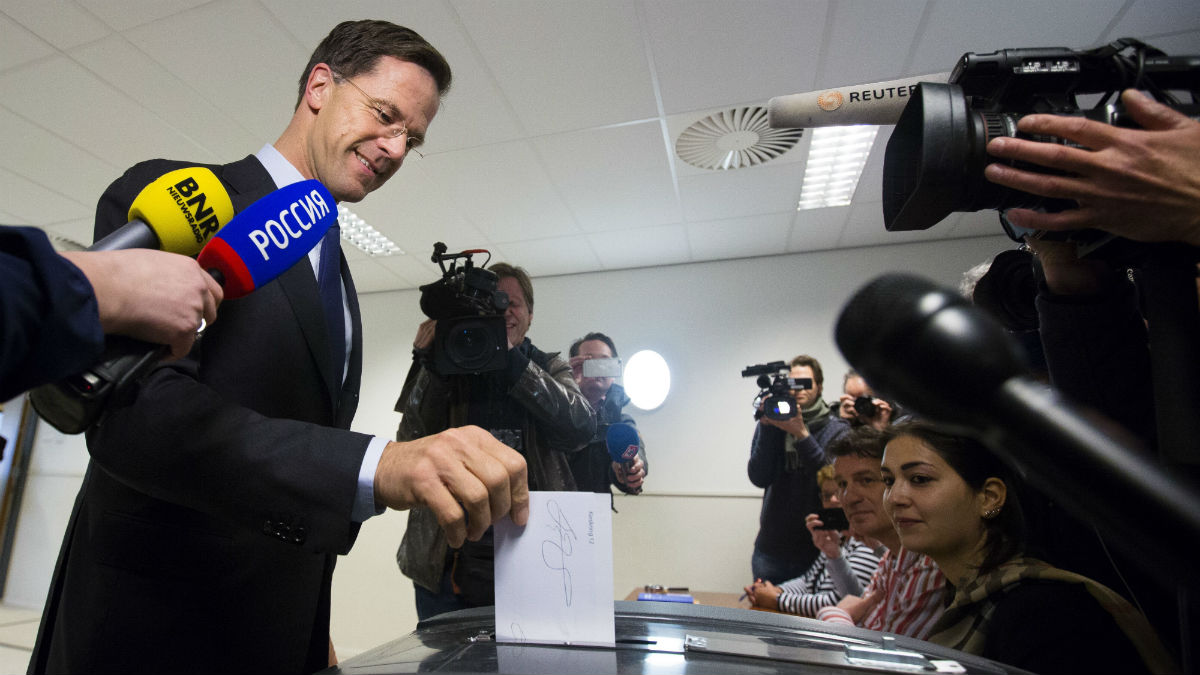Netherlands rejects EU-Ukraine partnership
Dutch referendum seen as a wider test of anti-European sentiment in run-up to UK vote in June

A free daily email with the biggest news stories of the day – and the best features from TheWeek.com
You are now subscribed
Your newsletter sign-up was successful
Voters in the Netherlands have rejected in a referendum an EU partnership deal with Ukraine.
At 32.2 per cent, the turnout was low but above the 30 per cent threshold for the vote to be valid. Just 38.1 per cent of voters were in favour of a deal with Ukraine, while 61.1 per cent rejected it.
Prime Minister Mark Rutte said his government may have to reconsider the deal, which has been ratified by all the other 27 member states of the European Union.
The Week
Escape your echo chamber. Get the facts behind the news, plus analysis from multiple perspectives.

Sign up for The Week's Free Newsletters
From our morning news briefing to a weekly Good News Newsletter, get the best of The Week delivered directly to your inbox.
From our morning news briefing to a weekly Good News Newsletter, get the best of The Week delivered directly to your inbox.
Although the non-binding vote is technically a referendum on removing trade barriers with Ukraine, it is being seen as a wider test of anti-EU sentiment.
Even the referendum's Eurosceptic organisers admitted it was not essentially about Ukraine but instead was a "handy hook to push a broader anti-EU agenda and 'give citizens more say in Brussels'", says The Guardian.
Despite the low turnout, the outcome could have big repercussions for Europe and the UK.
Whatever voters' motivations, a clear vote against the treaty in the run-up to Britain's EU referendum in June is likely to "escalate into a domestic or even a Europe-wide political crisis", says Reuters.
A free daily email with the biggest news stories of the day – and the best features from TheWeek.com
The EU's decision to push on with the Ukraine treaty regardless of the vote, which has angered some of those opposed to what they see as the arrogance of the Brussels bureaucratic machine, could be "damaging for the EU project by highlighting internal problems ahead of the British vote", says Newsweek.
"If politicians ignore the Dutch 'No' then it will be an even stronger signal than what the British have already received that there is no way to correct the European political class and that they should vote to leave," said No campaigner Thierry Baudet, one of the architects of the Dutch referendum.
Speaking in Amsterdam ahead of the vote, Ukip leader Nigel Farage said that a vote against the treaty would "embolden" those campaigning in the UK to leave the EU and "send a big message to the British electorate that we are not alone in thinking something has fundamentally gone wrong in the direction of the European Union".
Ukrainian President Petro Poroshenko has said his country will nevertheless "continue" its movement "towards the EU".
-
 ‘Restaurateurs have become millionaires’
‘Restaurateurs have become millionaires’Instant Opinion Opinion, comment and editorials of the day
-
 Earth is rapidly approaching a ‘hothouse’ trajectory of warming
Earth is rapidly approaching a ‘hothouse’ trajectory of warmingThe explainer It may become impossible to fix
-
 Health insurance: Premiums soar as ACA subsidies end
Health insurance: Premiums soar as ACA subsidies endFeature 1.4 million people have dropped coverage
-
 Putin’s shadow war
Putin’s shadow warFeature The Kremlin is waging a campaign of sabotage and subversion against Ukraine’s allies in the West
-
 Epstein files topple law CEO, roil UK government
Epstein files topple law CEO, roil UK governmentSpeed Read Peter Mandelson, Britain’s former ambassador to the US, is caught up in the scandal
-
 Iran and US prepare to meet after skirmishes
Iran and US prepare to meet after skirmishesSpeed Read The incident comes amid heightened tensions in the Middle East
-
 Grok in the crosshairs as EU launches deepfake porn probe
Grok in the crosshairs as EU launches deepfake porn probeIN THE SPOTLIGHT The European Union has officially begun investigating Elon Musk’s proprietary AI, as regulators zero in on Grok’s porn problem and its impact continent-wide
-
 Israel retrieves final hostage’s body from Gaza
Israel retrieves final hostage’s body from GazaSpeed Read The 24-year-old police officer was killed during the initial Hamas attack
-
 China’s Xi targets top general in growing purge
China’s Xi targets top general in growing purgeSpeed Read Zhang Youxia is being investigated over ‘grave violations’ of the law
-
 Panama and Canada are negotiating over a crucial copper mine
Panama and Canada are negotiating over a crucial copper mineIn the Spotlight Panama is set to make a final decision on the mine this summer
-
 The rise of the spymaster: a ‘tectonic shift’ in Ukraine’s politics
The rise of the spymaster: a ‘tectonic shift’ in Ukraine’s politicsIn the Spotlight President Zelenskyy’s new chief of staff, former head of military intelligence Kyrylo Budanov, is widely viewed as a potential successor